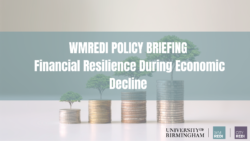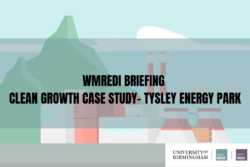At the recent Conservative Party Conference, the 15-minute city was highlighted as an attack on personal freedom. In this blog, Magda Cepeda-Zorrilla looks at what a 15-minute city is, gives examples of where it’s been implemented and whether it might restrict people’s freedom. The Department for Transport (DfT) recently released the Plan for Drivers document, … Continue reading “The 15-Minute City: Good Urban Planning or an Attack on Personal Freedoms?”
Category: Policy
How To Unlock Green and Place-Based Public Investment With the Help of HM Treasury’s Green Book and Systems Thinking in Economics
Professor Andrew Brown discusses the Green Book Review, how benefit-cost ratios continue to dominate appraisals, and how systems thinking in economics can act as an aid to implementing the Green Book Review. How should government ensure the ‘value for money’ of the public purse? Recently Bec Riley and I ran a workshop on this question … Continue reading “How To Unlock Green and Place-Based Public Investment With the Help of HM Treasury’s Green Book and Systems Thinking in Economics”
How Better Local Employment Support Could Help Tackle UK Labour Shortages
Abigail Taylor and Ceri Hughes discuss how a more local approach to Employment Support is needed to help tackle UK labour shortages. This blog was originally written for the conversation. This blog is also based on work conducted with Anne Green and Paul Sissons. There has been a rise in “economic inactivity” in the UK among … Continue reading “How Better Local Employment Support Could Help Tackle UK Labour Shortages”
“I Blame the Green Book”- Why has Guidance Become the Scape Goat of Public Funding Decisions like Levelling Up?
Rebecca Riley outlines some of the misconceptions around the use of the Green Book. As part of the Y-PERN conference held recently, I had a slot on a session about the Green Book, partly because I chair the Green Book User Network Steering Group, but also because City-REDI does a lot of work helping partners … Continue reading ““I Blame the Green Book”- Why has Guidance Become the Scape Goat of Public Funding Decisions like Levelling Up?”
Levelling Up: An Analysis of the Distribution of Funding in Round Two
Alice Pugh provides a breakdown of the latest round of Levelling Up funding. Which regions were the big winners, and who lost out this time around? View our analysis of Round One funding. View more of our work on Levelling Up In the second round of levelling up funding, 111 projects were awarded funding, with … Continue reading “Levelling Up: An Analysis of the Distribution of Funding in Round Two”
WMREDI Policy Briefing: Financial Resilience During Economic Decline
In this policy briefing, Dr Amir Qamar, Dr Emma Gardner, Professor Anne Green and Professor Simon Collinson review the financial health of the largest 50 manufacturing firms within the West Midlands. Introduction The ongoing impact of the UK’s departure from the EU, the aftermath of the pandemic, and the recent depreciation of the pound provide … Continue reading “WMREDI Policy Briefing: Financial Resilience During Economic Decline”
Clean Growth Case Study: Greater Birmingham and Solihull Local Enterprise Partnership (GBSLEP) and Tyseley Energy Park
In this policy briefing, Dr Juliane Schwarz examines the value and function of public funding by the Greater Birmingham and Solihull Local Enterprise Partnership (GBSLEP) into clean growth initiatives, such as Tyseley Energy Park (TEP), and how this supports clean growth in the West Midlands to become a net zero carbon economy by 2041. This … Continue reading “Clean Growth Case Study: Greater Birmingham and Solihull Local Enterprise Partnership (GBSLEP) and Tyseley Energy Park”
The Case for a Just Devolution
Liam O’Farrell discusses the idea of ‘Just Devolution’, whereby devolution is driven not by demands to stimulate growth but to create a more just society. Find out more about the Just City Project. Devolution is currently front and centre in British politics. There have been comparisons of the relative performance of the devolved governments in … Continue reading “The Case for a Just Devolution”
Universities and Levelling Up Policy Forum – Setting the Scene
This blog, by Des McNulty, Mike Boxall, Chris Millward and John Goddard, is the first outcome of a dialogue involving senior participants from universities, government and a variety of civic organisations to (i) discuss the role Universities might play in the implementation of the levelling up agenda and (ii) scope out the White Paper’s implications … Continue reading “Universities and Levelling Up Policy Forum – Setting the Scene”
STEM Assets in the West Midlands: Tyseley Energy Park
In this policy briefing, Robert Lynam, Chloe Billing and Simon Collinson look at the Tyseley Energy Park, University of Birmingham and explore the extent to which it is being leveraged to improve economic performance and social inequality in our region. The research represents the initial phase of a project which City-REDI/WMREDI are delivering on ‘Universities’ … Continue reading “STEM Assets in the West Midlands: Tyseley Energy Park”










